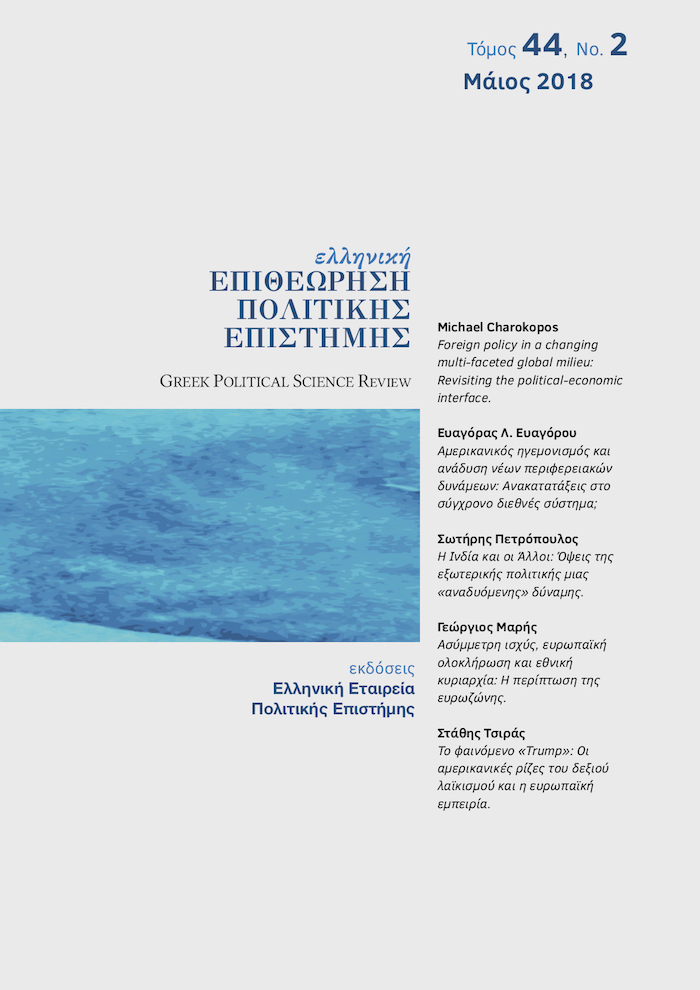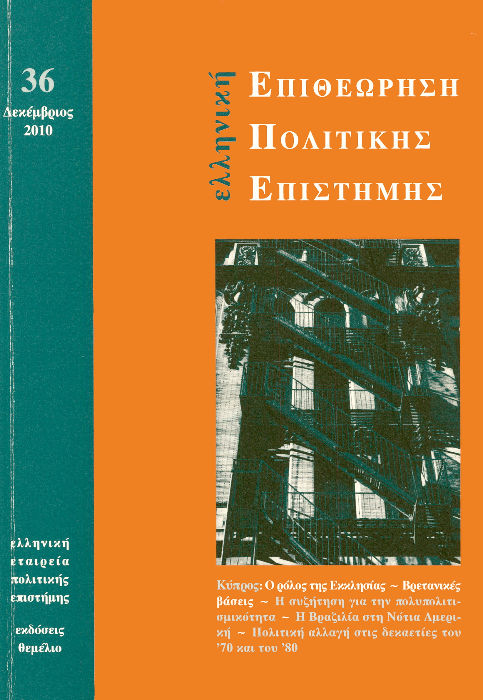Η Ινδία και οι Άλλοι: Όψεις της εξωτερικής πολιτικής μιας «αναδυόμενης» δύναμης

Δημοσιευμένα:
Apr 30, 2018
Λέξεις-κλειδιά:
Ινδία αναδυόμενες δυνάμεις εξωτερική πολιτική
Περίληψη
Κατά τις τελευταίες δύο δεκαετίες η Ινδία είχε μια δυναμική παρουσία στην παγκόσμια οικονομία. Παρά την παρουσία αυτή, η εξωτερική της πολιτική ήταν κατά κάποιο τρόπο μη ενεργητική, αντανακλώντας σε μεγάλο βαθμό αδύναμες γραφειοκρατικές δομές και μια αμφισημία ανάμεσα σε ιδεαλιστικές επιλογές και μια πιο πραγματιστική προσέγγιση. Το άρθρο αναλύει την εξωτερική πολιτική της Ινδίας τόσο διαχρονικά όσο και υπό το πρόσφατο πρίσμα της «αναδυόμενης» δύναμης επιχειρώντας τη διερεύνηση μελλοντικών τάσεων και συμπεραίνει ότι η ινδική εξωτερική πολιτική στρέφεται ολοένα και περισσότερο στον ανταγωνισμό με την Κίνα και στην οικονομική διπλωματία.
Λεπτομέρειες άρθρου
- Πώς να δημιουργήσετε Αναφορές
-
Πετρόπουλος Σ. (2018). Η Ινδία και οι Άλλοι: Όψεις της εξωτερικής πολιτικής μιας «αναδυόμενης» δύναμης. Ελληνική Επιθεώρηση Πολιτικής Επιστήμης, 44(2), 67–86. https://doi.org/10.12681/hpsa.16368
- Τεύχος
- Τόμ. 44 Αρ. 2 (2018)
- Ενότητα
- Άρθρα

Αυτή η εργασία είναι αδειοδοτημένη υπό το CC Αναφορά Δημιουργού – Μη Εμπορική Χρήση – Παρόμοια Διανομή 4.0.
Οι συγγραφείς θα πρέπει να είναι σύμφωνοι με τα παρακάτω: Οι συγγραφείς των άρθρων που δημοσιεύονται στο περιοδικό διατηρούν τα δικαιώματα πνευματικής ιδιοκτησίας επί των άρθρων τους, δίνοντας στο περιοδικό το δικαίωμα της πρώτης δημοσίευσης. Άρθρα που δημοσιεύονται στο περιοδικό διατίθενται με άδεια Creative Commons 4.0 και σύμφωνα με την οποία μπορούν να χρησιμοποιούνται ελεύθερα, με αναφορά στο/στη συγγραφέα και στην πρώτη δημοσίευση για μη κερδοσκοπικούς σκοπούς και με δικαίωμα τροποποίησης μόνο με παρόμοια διανομή (αν αναμείξετε, τροποποιήσετε, ή δημιουργήσετε πάνω στο υλικό, πρέπει να διανείμετε τις δικές σας συνεισφορές υπό την ίδια άδεια όπως και το πρωτότυπο).Λήψεις
Τα δεδομένα λήψης δεν είναι ακόμη διαθέσιμα.
Αναφορές
Skai.gr. 2016, Σε ελληνο-ινδική κοινοπραξία το αεροδρόμιο στο Καστέλι, 27 Οκτωβρίου, http://www.skai.gr/news/greece/article/329045/plirofories-se-ellino-indiki-koinopraxia-to-neo-aerodromio-sto-kasteli/, προσπέλαση 12 Δεκεμβρίου 2016.
Allen, David. 2013, The EU and India: Strategic Partners but not a Strategic Partnership, in Thomas Christiansen, Emil Kirchner and Philomena Murray, eds, The Palgrave Handbook of EU-Asia Relations, London: Palgrave Macmillan, pp. 571-86.
Chacko, Priya. 2012, Indian foreign policy: the politics of postcolonial identity from 1947 to 2004, London: Routledge.
Chacko, Priya. 2013, A New “Special Relationship”?: Power Transitions, Ontological Security, and India–US Relations, International Studies Perspectives 15(3), pp. 1-18.
Chacko, Priya. 2014, The rise of the Indo-Pacific: understanding ideational change and continuity in India's foreign policy, Australian Journal of International Affairs 68(4), pp. 433-452.
Chacko, Priya. 2015, The New Geo-Economics of a “Rising” India: State Transformation and the Recasting of Foreign Policy, Journal of Contemporary Asia 45(2), pp. 326–344.
Chiriyankandath, James. 2004, Realigning India: Indian foreign policy after the Cold War, The Round Table: The Commonwealth Journal of International Affairs 93(374), pp. 199-211.
Damodaran, Vinita. 2007, Famine in Bengal: A Comparison of the 1770 Famine in Bengal and the 1897 Famine in Chotanagpur, The Medieval History Journal 10(1-2), pp. 143-81.
Delegation of the EU in India. 2016, The European Union & India Trade & Investment 2016.
Destradi, Sandra. 2012, Indian Foreign and Security Policy in South Asia: Regional Power Strategies, London: Routledge.
Economist, The. 2016, New rivals on a contested continent: Asia’s scramble for Africa, 13 August.
Economist, The. 2016a, Kashmir: Reviving the cause, 13 August.
European Commission. 2016, «EU-India Trade Relations Statistics», DG for Trade.
Ganguly, Sumit. 2010, Indian defence policy in Sumit Ganguly, ed., The Oxford Companion to Politics in India, Oxford: Oxford University Press.
Hall, Ian. 2010, The other exception ? India as a rising power, Australian Journal of International Affairs 64(5), pp. 601-611.
Hall, Ian. 2015, Is a “Modi doctrine” emerging in Indian foreign policy?, Australian Journal of International Affairs 69(3), pp. 247-252.
Hall, Ian. 2016, Multialignment and Indian Foreign Policy under Narendra Modi, The Round Table 105(3), pp. 271-286.
Malone, David M. 2011, Does the Elephant Dance ? Contemporary Indian Foreign Policy, Oxford: Oxford University Press.
Mazumdar, Arijit and Erin Statz. 2015, Democracy Promotion in India’s Foreign Policy: Emerging Trends and Developments, Asian Affairs 42(1), pp. 77-98.
Mehta, P. B. 2009, Still under Nehru’s shadow ? The absence of foreign policy frameworks in India, India Review 8(3), July-September, pp. 209-233.
Miller, Manjari Chatterjee. 2013, India’s Feeble Foreign Policy, Foreign Affairs May-June, pp. 14-9.
Miller, Manjari Chatterjee. 2014, Wronged by Empire: Post-Imperial Ideology and Foreign Policy in India and China, Palo Alto, CA: Stanford University Press.
Mohan, C. Raja. 2014, Not So Easy to Act East, Indian Express, 22 November.
Mohan, Raja. 2015, Modi’s world: Expanding India’s sphere of influence, Delhi: HarperCollins.
Mukherjee, Rohan and David M. Malone. 2011, Indian Foreign Policy and Contemporary Security Challenges, International Affairs 87(1), pp. 87-104.
Narang, Vipin and Paul Staniland. 2012, Institutions and Worldviews in Indian Foreign Security Policy, India Review 11(2), pp. 76-94.
Ollapally, Deepa. 2011, India: The Ambivalent Power in Asia, International Studies 48(3 & 4), pp. 201-222.
Pant, Harsh V. 2008, Contemporary Debates in Indian Foreign Policy: India Negotiates its Rise in the International System, Basingstoke: Palgrave Macmillan.
SAARC, Kathmandu Declaration 2014, 27 Νοεμβρίου 2014.
Sagar, Rahul. 2009, State of Wind: What kind of power will India become?, International Affairs 85(4), pp. 801-16.
Schottli, Jivanta. 2012, Vision and strategy in Indian politics: Jawaharlal Nehru’s policy choices and the designing of political institutions, London: Routledge.
Sen, Ronojoy. 2015, Nation at Play: A History of Sport in India, New York: Columbia University Press.
Sikri, Rajiv. 2009, Challenge and Strategy: Rethinking India’s Foreign Policy, London: Sage.
Schmidt, D. J. 2016, India’s Rise, the European Union and the BRICS: An Uneasy Relation in Rewizorski M., ed. The European Union and the BRICS, Complex Relations in the Era of Global Governance, London: Springer, pp. 121-140.
Smith, Karen. 2012, India’s Identity and its Global Aspirations, Global Society 26(3), July, pp. 369-85.
Solomon, Hussein. 2012, Critical reflections of Indian foreign policy: Between Kautiliya and Ashoka, South African Journal of International Affairs, 19(1), pp. 65-78.
Sood, Vikram. 2009, India and regional security interests in Alyssa Ayres and C. Raja Mohan, eds. Power Realignments in Asia: China, India and the United States, London: Sage.
Spiers, Edward M. 1980, The Army and Society: 1815-1914, London: Longman.
Sullivan, Kate. 2014, Exceptionalism in Indian Diplomacy: The Origins of India's Moral Leadership Aspirations, South Asia: Journal of South Asian Studies 37(4), pp.640-655.
Vandewalle, Laurence and Saarela, Anna. 2016, EU-India relations -keeping up the momentum needed for a vital strategic partnership, DG External Policies, September.
Viyekanandan, Jayashree. 2011, Interrogating International Relations: India’s Strategic Practice and the Return of History, London: Routledge.
Wulf, Herbert and Tobias Debiel. 2015, India’s “Strategic Autonomy” and the Club Model of Global Governance: Why the Indian BRICS Engagement Warrants a Less Ambiguous Foreign Policy Doctrine, Strategic Analysis 39(1), pp. 27-43.



